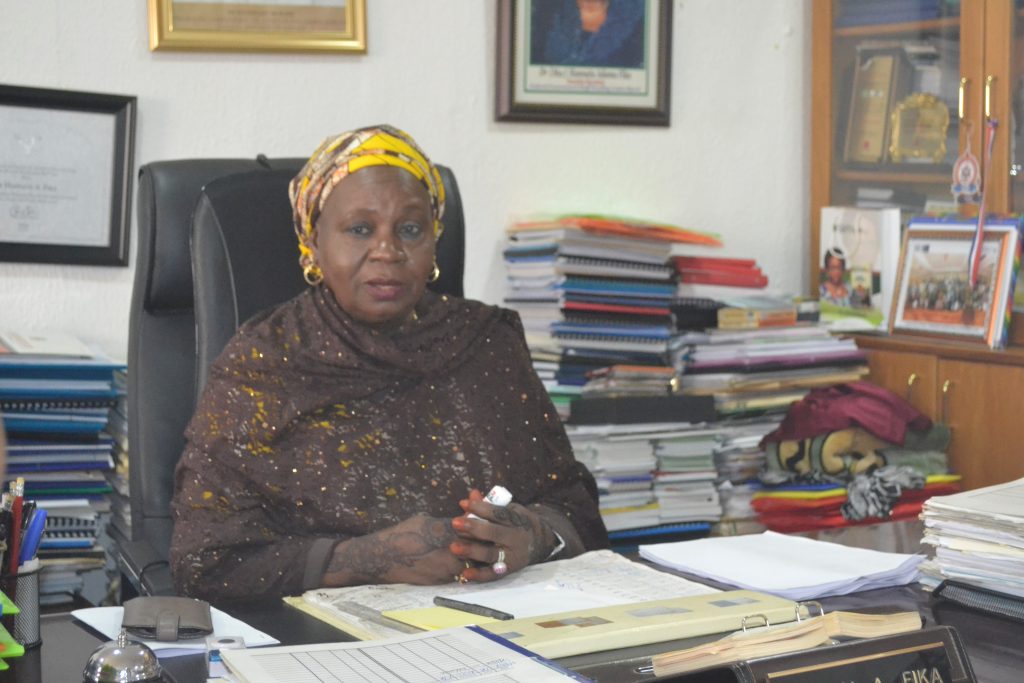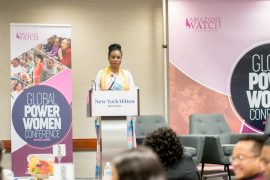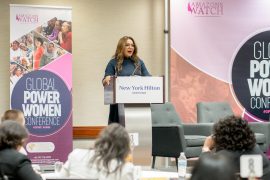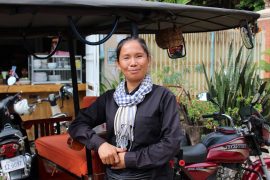Dr. Hannatu Adamu Fika, Executive Secretary/CEO, Federal Government Staff Housing Loans Board is a source of inspiration to women and young girls in Nigeria, especially, the North Eastern part where she comes from. In this exclusive interview with the Amazons Watch magazine, Dr. Fika shared some of her efforts in impacting the lives of public servants and women in Nigeria. Excerpt:
Media reports, findings and research are inundated with various issues that confront the holistic development and empowerment of the girl-child in rural and urban areas of the country. Kindly share with us some of your experiences growing up as a girl in Borno State.
Thank you very much. Fifty seven years ago, I was a girl-child. I had an advantage in that the part of Borno that I come from is Southern Borno. If we take 100% for instance, 55% of the people in Southern Borno State are Christians. So, we had the advantage of missionaries opening up schools in Southern Borno. As such, most of us attended missionary schools.
My father studied law at the Ahmadu Bello University. Most of us went to school because we knew the value of Western education. But when you talk about the North (of Nigeria), quite a sizable number of Northern women went to school up to degree level. But what we were not able to do then was to get employments after we graduated from school.
The communities see the good to get Western education, because the Quran encourages learning as well. Muslim women were encouraged to get Western education. But after getting western Education, the society also asked us to stay at home to bring up our children and take care of our husbands.
But again, quite a number of us took up appointment with the government because we felt we had to contribute our own quota towards the development of Nigeria. Even those who dropped out to get married, our state government and the National Council for Women Society, ensured that go back to schools, even the University; and when they came back, they were employed as teachers, nurses and administrators.
Since then, things have been changing. When we were young, bread was cheap, but as we were growing up, men alone could not mobilize resources to buy bread as things became more expensive; so, the husband and wife had to put resources together to buy bread. So in a literal way, we needed two hands so that we can move forward. During our days, we went to public schools, and public schools were very good, there were no private schools. But today we find ourselves in a situation that most of our children had to go to private schools and that is a discouragement.
You started your career as a Civil Servant in the Borno State Civil Service; and rose through the ranks, serving in various capacities, to become Executive Secretary and Chief Executive Officer of the Federal Government Staff Housing Loans Board. Kindly take us through your career journey and share with us some of the key accomplishments you have recorded over the course of your career.
When I graduated in 1976, before we went in for our National Youth Services Corps (NYSC), you have the opportunity then, because there were no too many students who were in the University; so throughout the country, when you were in year 3, the civil service commission of the state will come to you to interview you for a job. We knew definitely that when we finish the University we will get a job. So that was how we started. It was very easy to get a job, unless we want to be at home raising our children.
So, after my NYSC, I was employed by the Borno State Government as an Assistant Secretary II, which is an administrative Officer. Before then, it was difficult to become administrators; we were only giving jobs of teachers even if you are not interested in teaching. That was what they imposed on us; by so doing, they believed that at noon, we will finish our jobs for the day, and go home to take care of our family. But there are some of us who do not take it kindly, because we were not trained to be teachers and for you to be a successful teacher, you have to be interested in being a teacher. And for me, I was not. The reason is because the community I come from, a lot of the girls did not understand English; and for example, where I was sent to teach then, it was not even after my university; you know, when you go through a higher school certificate, for almost one year, you have to go back and teach. So, I was sent to girls’ school to teach; and for me, it was very frustrating as I did not understand their local language. I could only speak English and Hausa, which they did not understand and so it became so frustrating. So, I had to go back to the Ministry of Education to beg them to give me something different.
So as we progressed, let me bring you back, quite a number of us, the females of Borno State, were not taking it too kindly to go to the classrooms to teach. So with the intervention of the President of this country (President Muhammadu Buhari), the Governor of Borno State, that opened ways for women to go into administration and compete with the men. So, that was how we became divisional officers, assistance secretaries and some of us were sent to the divisions to do the work that men were doing. And for that we are grateful to him.
And at the state level, I grew up from the administrative cadre up to the position of a director, before I crossed over to the Federal Civil Service in 1990, where I worked with the office of the Secretary to the Government of the Federation and then moved to the National Commission for Women. I thereafter worked with the then First Lady, Mrs. Maryam Babangida as director of Better Life Programme, till 1995.
Then, Mrs. Abacha came in as First Lady of Nigeria, and we had another programme, of which I was Director- Family Support Programme, until I was deployed to Local Government Affairs as Director. So, I moved from one Ministry to another. You know when you leave one ministry to another you acquire a different nomenclature. I was posted to this office (Federal Government Staff Housing Loans Board), as Director/ Secretary, before my appointment as the Executive Director/CEO, a position I have held up till this time, by the Grace of God.
I am enjoying the job because it is a job for the less privileged. It is so because they are poorly paid and yet expected to work hard, because if civil servants do not work, no country moves. This is why, as you must have seen as journalists, Mr. President (Muhammadu Buhari), yesterday, expressed his commitment to having a new minimum of wage and the proposed N30, 000 has been presented to the National Assembly. So, what is expected for the civil servant is to work for N30, 000 so that they do not relax. N30, 000 is a lot of money as there are so many civil servants. We are so lucky that there is no retrenchment as an alternative of that N30, 000.
You have received both local and international recognitions for your commitment to the housing needs of Nigeria’s public servants. Reports show that the number of public servants who have benefited from Board’s housing loans scheme, since you assumed leadership of the board in 2007, has risen from 12,556 to 30, 212. How do you achieve this stellar performance?
Actually, the Board is older than Nigeria herself. It was established in 1924 when we were in territories. At that time, it was known as the Africa Housing Loans Board. In 1976, the name changed to Federal Government Staff Housing Loans Board. The Government has a responsibility as part of its social responsibility to its people in establishing the Board so that a niche is carved out for Federal Government workers as part of motivation.
I believe anybody who has a house of his/her own, 70% of his/her challenges are met as all they have to worry about is school fees and health; and fortunately, Government has a programme to address health concerns. And Government has also ensured that any worker that wants to be a farmer, can farm; and it will not be a barrier to the ethics of the service. So, you have that opportunity to grow what you want to eat. When you have a house, you grow what you want to eat, and your healthcare is being taken of, I believe you have nothing to worry about.
So, the Board was established by law to give mortgages. And you are expected to use the mortgages to be build your own house, which you can supervise, or for you to identify your own property developer, inform the Board to pay your loan to the property developer to build the house for you. If you already have a house, and this happened under the monetization programme of the Government, where old houses were sold to tenants, and they felt the need to renovate the house, so the loan also provide for that. The loan also provide for you to buy a piece of land to build your own house. The intention of government for the board has been marvelous.
The figures you have given me have increased over the last one month. The Minister of Finance has graciously injected some funds to us of which about 500 loans have been given. I will like you to know that everybody does not get the same amount of money as we look at your inflow as salary so that we do not break the financial regulations. So, we have tried. And we are trying our own quota to see how we can reduce the housing deficit in the country.
Do you work with the Private sector?
Of course, the developers come from the private as they are the ones we are working with to construct the houses under the purview of the National Housing Programme. You know that nobody wants to build a house today that will collapse tomorrow; so the private developers who are experts in this field are given the opportunity as long as the civil servant identifies with them.
The World Economic Forum ranked Nigeria 122 in the 2017 Global Gender Gap Report, revealing a widening gender gap across health, education, politics and the workplace. You served as Deputy Director, Director and Ag Director General of the National Commission for Women Affairs, from 1992 to 1995. Also, you have led initiatives and programmes aimed at women empowerment and development. Kindly tell us more about your successes in improving the health and social wellbeing of women, as well as your efforts in supporting, mentoring and empowering women in the country?
Actually I started the job of empowering women even before I became a deputy director, because I have been a grassroots mobiliser. As the saying goes, if you empower a man, you are empowering one person, but if empower the woman, you are empowering a whole, group of people- the woman herself, the children and even the husband.
So, I believe in the concept of making women independent financially. So, you don’t have to be insulting your husband every day to give you money to buy “Maggi”, “salt” and so on. I have never believed in that. I want the woman to stand to her feet and contribute her own quota to the development of this country.
We grew up seeing our mothers going to the farm, and at the end of the season, sell the farm produce and use to proceeds to send us to school. Now we have gone to school; we are literates; and we have jobs; why should we not empower the women to stand on their woman? I sincerely, believe in that; this is why during my young days I joined the National Commission for women to mobilize women in my state.
You know it is quite difficult to mobilize women in the state where I come from because, it is predominantly, a Muslim state, and I am not saying in a Muslim state women are not contributing their own quota, but is not as easy as what happens elsewhere. So I and a team of other women, who believe in empowering women, were going from one local government to another asking the women to identify what they needed and then we worked with the then First Lady, Mrs. Babangida (Mrs. Maryam Babangida) to provide little resources, to these women to establish their own skills. We believe even when they are at home in purdah, they can do “kuli kuli” and then send somebody out to sell that “kuli kuli” for them and then they will get resources. They can do it for the women who come from the South who can sell them. So we believe in empowering the women so that they can take care of the home front, their children and even the man who is our own head.
So, when I became the director of women affairs, I worked very closely with Mrs. Maryann Babangida on the Better Life Programme, where we had programmes throughout the 36 States of the country. Every skill that can bring in money for the woman to help her family, we participated in it and supported them.
When Mrs. Abacha (Mrs. Maryam Abacha) came in, she introduced the Family Support Programme, where we saw the need for social welfare programmes. We were able to do a lot under her leadership. Look at the National Hospital of today, it was a scheme under the First Lady and I happened to be the director, Family Support Programme.
There was only one General Hospital in Abuja, which was located in Gwagwalada; we believed that women have health challenges which were peculiar to them and their children; so before one leaves Asokoro or Garki to Gwagwalada, one would have been dead on the way. So, the First Lady believed in establishing this hospital for women and children. The National Hospital was first christened as Hospital for Women and Children; and a year later, we felt it should also address the health challenges of men, so that is how the National Hospital was established.
And when you go to my experience in the Local Government, I believe you must have held that name, ALGON (Association of Local Governments of Nigeria). I was the Architect of that programme. We worked with the Chairmen of Local Governments to get certain independence. If the Local Government works well, we will not care about the person that sits as Governor is, or who the President; So we decided to form ALGON so that they come together to address the less privileged in the communities. Nigeria is made up 774 Local government and if these governments are up and doing, Nigeria will be up and doing. Challenges of armed robbery and kidnapping will be addressed.
I also worked in the office of the Accountant General as director in charge of administration before I was posted to the Federal Government Housing Loans Board. I believe that the award that the Centre for Economic and Leadership Development is going to confer on me is in recognition of my role in civil service.
When I was deployed here, I uncounted quite a number of challenges; Even the Head of Service who posted me here did so with the aim of solving the challenges, to motivate public servants to work better. So, I took up this challenge to see how we can mobilize resources to ensure that public servants own their own homes while they are still in service in preparation for their retirement.
And happily I have the support of my Governing Board, and the support of all the heads of service that I have worked with, including the support of all my staff here in the board. With the available resources to us, we should be able to advance the public servant to own their own homes so that they can live happily with their families.
One big thing we have been able to do, is to ensure that whoever got loans from the time that the Board was established till date, was documented them, we have them on our archive so that everybody know that government is contributing their own quota towards the motivation of the their staff. We have been able to computerize our loan registry so that everybody sees what is happening. The first loan given by the Board was in 1950, and that loan went to the Secretary of the then Prime Ministry of this country. And from our own document, that house stands tall in Surulere in Lagos. Quite a number of houses through our loans scheme are there in Abuja and we have document to show you these house. As the CEO of this board, I feel fulfilled that i was able to touch the lives of public servants. It is actually difficult for a civil servant to own a house in Abuja with a minimum wage of N18, 000. With the minimum wage of N30, 000 as presented to the President by Amal Pepple’s committee, this will affect what our loans ceiling will now be, because the ceiling usually reflects the minimum wage.
What is the duration of Loan payment?
The length of loan payment reflects the number of years you have in the service. However, the maximum is 25 years. The present Government is making a lot of efforts in providing housing for Nigerians. The Minister of Works, Power and Housing has been talking about empowering Nigerians through owning their own homes. Last year, the Government established the Family Homes Funds so mop resources for public servants and Nigerians to access to own their homes. You are aware, the Federal Mortgage Bank have been in existence for a very long time contributing their quota for Nigerians to own their own home, The Federal Housing Authority is also there. So, everybody is contributing.
We also expect the private sector to come in. Private sector alone cannot provide housing. So what Government does is to provide a level playing ground for mortgages to be given for houses at single digit to developer who have indicated interest to go into development of houses. And we are expecting an intervention from the Federal government of Nigeria, just as it has intervened in industries. Housing is very important as it touches the lives of every citizen in this country. It has to be a partnership between the public and private sector. According to Nigeria’s Land Law, all land belong to the goverbnmen6 and we are hoping that government at federal, State and local levels will make land ownership very flexible, especially for people going into mass housing; and when he interest rate for mortgages are single digits, the challenges have been brought to the barest minimum.
What’s the best way for the readers of Amazons Watch Magazine, who have been inspired by your work, to connect with you (You can include links to your social networks and websites) Optional?
I am personally interested in seeing every woman empowered. I do not want the men to hear this, but they have to be here. Everywoman that applies for a loan is a priority for me. We women have a lot of challenges. Some women grew up with their spouses, and at the end of the day, having pulled in resources, to build their homes, suddenly levels will change; the woman is divorced. And the children will pack out with their mother, and so these women become homeless. As a woman myself, it is my responsibility under the powers given to me by the president to be the CEO of this place, apart from motivating them to stay in marriage, to also motivate them to own their homes, even if they are staying in homes, built by their husband. There is nothing that attracts value like a home. So, I have also tried to empower the girl child to ensure that they go to school and get a job upon graduation so that they can have financial independence. Even in Saudi Arabia where it has been conservative at a time, the women are now working, each time I go to Saudi Arabia as a Muslim and I see women working I am always happy. We are looking forward to, if the men will allow us, to be empowered so that the rich women among us will pull us together so that we can speakers of the House and senate presidents and the men will vote for us.




